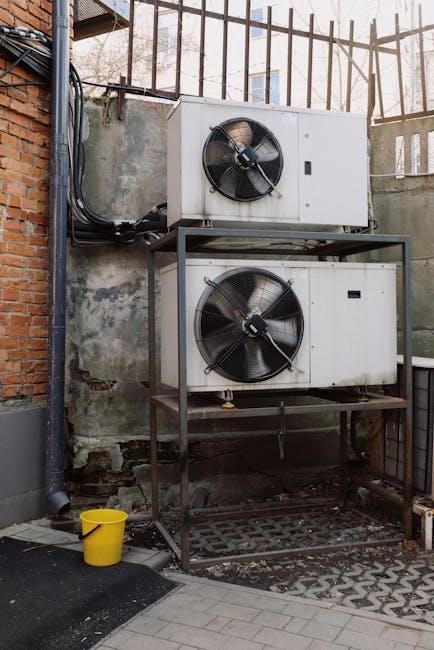An HVAC maintenance contract is a service agreement ensuring regular system check-ups, repairs, and maintenance, offering property owners peace of mind and optimal system performance.
What is an HVAC Maintenance Contract?
An HVAC maintenance contract is a formal agreement between a service provider and a property owner, outlining the terms for routine maintenance and repairs of heating, ventilation, and air conditioning systems. It ensures regular inspections, cleaning, and servicing to maintain system efficiency and prevent breakdowns. The contract typically includes details such as the scope of services, payment terms, and scheduling of visits. This legally binding document provides peace of mind for property owners by ensuring consistent system performance and extending equipment lifespan. It is customizable to fit residential or commercial needs and often includes provisions for emergency services and priority response.
Importance of HVAC Maintenance Agreements
Importance of HVAC Maintenance Agreements
HVAC maintenance agreements are essential for ensuring the longevity, efficiency, and reliability of heating, ventilation, and air conditioning systems. Regular maintenance prevents unexpected breakdowns, reduces repair costs, and minimizes the risk of health hazards like mold growth or poor air quality. These agreements ensure compliance with local and federal regulations, promoting energy efficiency and environmental sustainability. They also provide property owners with peace of mind, knowing their systems are well-maintained and functioning optimally. Additionally, such contracts often include priority service and emergency response, ensuring swift resolution of issues. By investing in an HVAC maintenance agreement, property owners can extend the lifespan of their systems and avoid costly replacements.
Benefits for Property Owners and Service Providers
HVAC maintenance agreements offer mutual benefits for property owners and service providers. Property owners gain consistent system performance, reduced energy bills, and extended equipment lifespan. Regular maintenance prevents costly repairs and ensures compliance with safety standards. Service providers benefit from a steady income stream, building long-term customer relationships, and opportunities to upsell additional services. These agreements also allow providers to manage their schedules efficiently, ensuring timely maintenance visits. Both parties enjoy transparency in services and costs, fostering trust and satisfaction. This win-win arrangement ensures reliable HVAC operation and supports business growth for service providers. It’s a practical solution for maintaining comfort and system integrity.
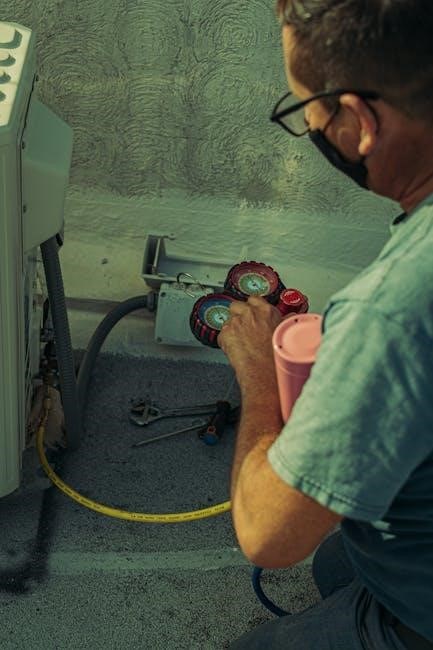
Key Components of an HVAC Maintenance Contract
A comprehensive HVAC maintenance contract outlines the scope of services, cost structures, payment terms, maintenance schedules, and inspection protocols to ensure system efficiency and compliance.
Scope of Services
The scope of services in an HVAC maintenance contract outlines the specific tasks included, such as routine inspections, filter cleaning, and system checks. This ensures clarity for both parties, detailing what is covered and what is not. Typically, it includes preventive maintenance to optimize system performance, reduce breakdowns, and extend equipment lifespan. Services may also cover repairs, replacements, or emergency calls, depending on the agreement. By defining the scope, the contract ensures that the service provider delivers consistent and reliable work, while property owners understand the extent of coverage and can plan accordingly. This section is crucial for setting expectations and avoiding disputes.
Cost and Payment Terms
The cost and payment terms in an HVAC maintenance contract outline the financial obligations for both parties. Typically, contracts specify annual fees, ranging from $150 to $500, depending on services and location. Payment schedules may include monthly retainers, lump sums, or per-visit charges. The agreement clarifies payment methods, such as checks, bank transfers, or credit cards, and the timeline for submitting payments. Some contracts include additional fees for emergency services or priority scheduling. Property owners should review these terms to ensure they align with their budget and service needs. Transparent payment structures help avoid disputes and ensure smooth financial transactions throughout the agreement.
Scheduling and Frequency of Maintenance
The scheduling and frequency of maintenance are crucial aspects of an HVAC maintenance contract. Typically, contracts outline regular service visits, often bi-annually or tri-annually, depending on the system’s usage and local climate. For instance, maintenance is commonly scheduled before peak seasons, such as summer and winter, to ensure optimal performance. The agreement may specify exact dates or allow flexibility for the service provider to coordinate with the property owner. Consistent scheduling ensures the HVAC system operates efficiently, reducing the risk of unexpected breakdowns. Property owners should review these terms to confirm they meet their specific needs and local weather conditions. Regular maintenance is essential for extending the system’s lifespan and maintaining indoor comfort.
Inspection and Reporting
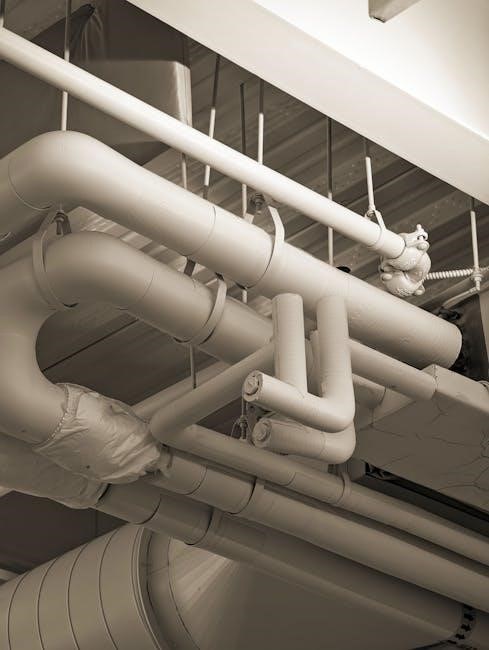
Inspection and reporting are essential components of HVAC maintenance contracts, ensuring transparency and accountability. During scheduled visits, technicians inspect the system for faults, clean components, and ensure optimal performance. Detailed service reports are typically provided, outlining the work performed, any issues identified, and recommendations for repairs or upgrades. These reports help property owners stay informed about their HVAC system’s condition and necessary actions. Regular inspections also enable early detection of potential problems, preventing costly repairs. Clear communication of findings is crucial, fostering trust between service providers and clients. Proper documentation ensures compliance with contractual obligations and industry standards, safeguarding both parties’ interests.

Types of HVAC Maintenance Contracts
Residential HVAC Maintenance Agreements
Residential HVAC maintenance agreements are tailored for homeowners, ensuring their heating, ventilation, and air conditioning systems operate efficiently year-round. These contracts typically include routine inspections, filter cleaning, and priority service for emergencies. By scheduling regular maintenance, homeowners can prevent costly repairs and extend the lifespan of their HVAC systems. Agreements often outline specific services, payment terms, and frequencies, providing clarity and peace of mind. They are particularly beneficial in extreme climates, where system reliability is crucial. Residential contracts are usually more affordable than commercial ones, with costs ranging from $150 to $500 annually, depending on the provider and services included. These agreements help maintain indoor air quality and comfort while ensuring energy efficiency.
Commercial HVAC Maintenance Contracts
Commercial HVAC maintenance contracts are designed for businesses, ensuring their heating, ventilation, and air conditioning systems run efficiently and reliably. These agreements often include comprehensive services such as system inspections, filter replacements, and duct cleaning to maintain optimal performance. Commercial contracts typically cover larger and more complex systems compared to residential agreements, requiring specialized expertise. They may also include provisions for emergency response times and priority service to minimize operational downtime. Businesses benefit from reduced energy costs, extended equipment lifespan, and compliance with safety regulations. Contracts are tailored to the specific needs of the facility, with costs varying based on the scope of services and system size.
Preventive Maintenance Agreements
Preventive maintenance agreements are structured plans that outline regular HVAC system inspections and upkeep to prevent breakdowns and ensure efficiency. These agreements typically include scheduled visits from certified technicians to clean, inspect, and repair components, reducing the risk of unexpected failures. By addressing issues early, property owners can avoid costly repairs and extend the lifespan of their HVAC systems. Such agreements often include priority service and discounted rates for parts and labor, providing added value. They are particularly beneficial for commercial properties and large residential complexes where system reliability is crucial. Regular maintenance also improves energy efficiency, lowering utility bills over time. These agreements are customizable to meet specific needs and budgets, ensuring comprehensive coverage for all HVAC components.
Choosing the right HVAC contract involves evaluating service providers, understanding contract terms, and assessing included services to ensure they meet your specific needs and budget effectively. Evaluating HVAC service providers is crucial to ensure reliability and quality. Look for licensed, insured, and experienced professionals with good reputations. Check reviews, ask for references, and verify certifications. Ensure they offer services tailored to your HVAC system’s specific needs. Compare pricing and contract terms to avoid hidden costs. A reputable provider will provide detailed service reports and adhere to local regulations. Prioritize providers offering emergency services and priority scheduling to ensure your system operates efficiently year-round. Proper evaluation ensures you select a trustworthy partner for maintaining your HVAC system effectively and sustainably. HVAC maintenance contracts typically range from one to five years, with renewal options to ensure continuous service. Automatic renewal clauses are common, but parties can opt for manual renewal. Understanding the contract duration is vital to avoid unexpected terminations or prolonged commitments. Reviewing renewal terms ensures alignment with evolving needs. Some contracts offer discounts for longer agreements, while others provide flexibility for annual renewals. Clarify termination clauses to avoid penalties if canceling early. Ensure the renewal process is transparent, with clear communication from the provider. Properly understanding these aspects helps maintain smooth service and avoids potential disputes, ensuring the HVAC system remains well-maintained over time. Understanding the services included in an HVAC maintenance contract is crucial for ensuring it meets your needs. Typically, contracts cover routine maintenance, filter cleaning, and system inspections. However, exclusions like repairs, parts replacement, or emergency services may require additional costs. Review the agreement to verify if services such as priority support or 24/7 availability are included. Some contracts may exclude older systems or specific equipment, so check compatibility. Optional add-ons like duct cleaning or UV light installation can enhance the agreement. Always clarify what is covered and what is not to avoid unexpected charges. This ensures transparency and helps tailor the contract to your specific requirements effectively. Legal considerations in HVAC contracts involve clear terms, termination clauses, and compliance with regulations to protect both parties and ensure accountability. An HVAC maintenance contract outlines the obligations of both parties, ensuring the service provider delivers agreed-upon services and the client adheres to payment terms. It specifies the scope of work, including routine inspections, repairs, and maintenance, while defining the responsibilities of each party. The contract must comply with local and federal regulations, ensuring all services meet legal standards. Clear terms prevent disputes, while termination clauses protect both parties if obligations are not met. This mutual agreement ensures accountability and transparency, fostering a professional relationship between the service provider and property owner. Termination clauses in HVAC maintenance contracts outline conditions under which either party can end the agreement. These may include failure to meet obligations, non-payment, or breach of contract terms. Penalties for early termination, such as fees or damages, are often specified to protect both parties. The contract may also detail notice periods required for termination, ensuring both the service provider and client are informed. These clauses provide clarity and safeguard against abrupt or unfair endings, maintaining a balanced agreement. Properly structured termination clauses prevent disputes and ensure smooth resolution if the contract is ended prematurely. They are essential for upholding fairness and accountability. An HVAC maintenance contract must adhere to local, state, and federal regulations to ensure legal and safe operations. Service providers are required to follow established standards for HVAC systems, including environmental regulations and safety protocols. Compliance ensures that all maintenance activities, such as refrigerant handling and system inspections, meet governmental guidelines. Contracts often include clauses that outline the service provider’s responsibility to comply with these regulations, protecting both parties from legal issues. Proper documentation and adherence to laws are crucial for maintaining accountability and avoiding penalties. This ensures that the HVAC system operates efficiently while meeting all legal requirements, safeguarding both the property and the environment. Downloadable HVAC maintenance contract PDF templates provide customizable agreements for residential and commercial systems, outlining services, costs, and terms for clear legal compliance and convenience. A residential HVAC maintenance agreement template is a customizable document designed for homeowners, ensuring regular system upkeep. It outlines scheduled services, payment terms, and emergency response protocols. Available in PDF format, this template simplifies contract creation, covering essential clauses like service frequency, inspection details, and termination conditions. Homeowners can modify it to include specific equipment or priority services, ensuring their HVAC systems remain efficient year-round. By using this template, both parties establish clear expectations, fostering a smooth and professional relationship. It’s a cost-effective solution for maintaining heating, ventilation, and air conditioning systems in residential properties. A commercial HVAC service contract example provides a structured agreement tailored for businesses, ensuring their heating, ventilation, and air conditioning systems operate efficiently. This template, often available in PDF format, includes detailed terms such as service schedules, emergency response plans, and payment structures. It also outlines the scope of work, including routine inspections and maintenance tasks. Designed for commercial properties, this contract example may cover multiple units and systems, ensuring minimal downtime and optimal performance. By referencing this example, businesses can create customized agreements that meet their specific HVAC needs, protecting their investment and maintaining a comfortable environment for employees and customers. A preventive maintenance agreement sample outlines a proactive approach to HVAC system care, focusing on regular inspections and upkeep to prevent breakdowns. Typically provided in PDF format, this template includes scheduled service visits, filter cleaning, and equipment checks. It ensures systems run efficiently, reducing energy costs and extending equipment lifespan. The agreement may offer priority service and discounted rates for repairs, benefiting both residential and commercial clients. By using this sample, property owners can establish clear expectations and maintain optimal HVAC performance throughout the year. This agreement is customizable to fit specific needs, ensuring comprehensive coverage and peace of mind for all parties involved. Customizing your HVAC maintenance contract allows you to tailor services, such as adding specific equipment, emergency response clauses, and flexible payment schedules, ensuring it meets your unique needs. Custom HVAC maintenance contracts can include specific services or equipment tailored to your system’s needs. For instance, adding UV light installations or advanced air filtration systems ensures comprehensive coverage. You can also specify maintenance for particular components, such as heat pumps or smart thermostats, ensuring they are regularly inspected and serviced. Additionally, emergency response clauses can be incorporated to guarantee priority service during system failures. By outlining these details, the contract becomes a personalized agreement that addresses all aspects of your HVAC system, ensuring optimal performance and longevity. This customization also provides clarity for both parties, avoiding future disputes or misunderstandings. Including emergency and priority services in an HVAC maintenance contract ensures rapid response during critical system failures. These clauses guarantee immediate attention from technicians, minimizing downtime and potential property damage. For instance, priority service agreements often include 24/7 availability, reduced wait times, and expedited repair scheduling. Emergency services may cover sudden breakdowns, extreme temperature conditions, or safety hazards like gas leaks. By specifying these terms, property owners gain peace of mind, knowing help is readily available. This provision is particularly vital for commercial settings where HVAC system reliability is crucial for operations and occupant comfort. Clear terms ensure both parties understand expectations and response protocols. This enhances trust and reliability in the service provider-client relationship. Modifying payment terms and schedules in an HVAC maintenance contract allows for flexibility to suit the client’s financial preferences. This may include monthly installments, annual payments, or variable fees based on service frequency. Clients can opt for fixed retainer fees or pay-per-service models, depending on their HVAC usage and budget. Payment methods such as checks, bank transfers, or credit card payments can be specified for convenience. Additionally, due dates, late fees, and penalties for missed payments should be clearly outlined. Customizing payment terms ensures transparency and mutual agreement, fostering a smooth and stress-free relationship between the service provider and the property owner. This adaptability enhances contract satisfaction and compliance. Best practices for HVAC service providers include clear communication, detailed service reports, and ensuring customer satisfaction to build trust and long-term relationships. Clearly communicating contract terms ensures both parties understand their obligations, avoiding misunderstandings. Service providers should outline scope, costs, payment schedules, and maintenance frequency in plain language. This transparency builds trust and ensures compliance with legal standards. Using PDF templates or digital tools can help present information concisely. Including details like emergency services and exclusions prevents disputes. Regularly reviewing and explaining contract clauses fosters a collaborative relationship, ensuring smooth execution of HVAC maintenance agreements. Open dialogue about expectations and responsibilities is key to a successful, long-term partnership. Providing detailed service reports is essential for transparency and accountability in HVAC maintenance contracts. These reports should include the date, time, and location of the service, as well as the technician’s name and client information. A comprehensive list of tasks performed, such as filter cleaning, coil inspection, and refrigerant checks, should be documented. Any issues identified, like leaks or faulty components, should be noted, along with recommendations for future maintenance. The report should also summarize the services provided, outline costs, and include space for technician and client signatures. Using digital tools or PDF templates ensures consistency and clarity, fostering trust and ensuring all parties are informed. This level of detail not only enhances client satisfaction but also serves as a valuable record for future reference. Ensuring customer satisfaction is crucial for building long-term relationships in HVAC maintenance services. Service providers should prioritize clear communication, prompt responses to issues, and professionalism during visits. Technicians should be courteous, explain their work, and ensure the client understands the services performed. Providing detailed service reports and maintaining open lines of communication fosters trust and transparency. Additionally, offering customizable agreements and priority service options can enhance client satisfaction. By addressing concerns promptly and delivering reliable, high-quality work, HVAC providers can meet client expectations and build loyalty. Regular follow-ups and feedback opportunities further demonstrate commitment to customer satisfaction, ensuring clients feel valued and supported throughout the contract term. Use templates and software tools to draft agreements, include essential clauses, and ensure all terms are clear before finalizing and obtaining e-signatures from both parties. Utilizing pre-designed HVAC maintenance contract templates and software tools simplifies the creation process. Platforms like Jotform Sign and PandaDoc offer customizable templates that cater to specific needs. These tools allow easy editing, e-signature integration, and secure sharing. They ensure consistency and professionalism in the agreement. By leveraging these resources, service providers can efficiently draft contracts that include essential clauses and comply with legal standards. Templates also reduce drafting time, enabling focus on personalized terms and services. This approach streamlines the agreement process, ensuring clarity and mutual understanding between both parties. It’s a cost-effective and efficient way to establish a legally binding contract. When drafting an HVAC maintenance contract, incorporating essential clauses and provisions is crucial for clarity and mutual protection. These include the scope of services, payment terms, termination conditions, and compliance with local regulations. The agreement should outline the client’s responsibilities, such as providing access to equipment and timely payments. It should also detail the service provider’s obligations, like adherence to industry standards and timely responses to emergencies; Including these provisions ensures both parties understand their roles and reduces potential disputes. A well-structured contract fosters trust and accountability, making it a fair and legally binding document for all involved. Finalizing and signing the HVAC maintenance contract is the last step before it becomes legally binding. Both parties should thoroughly review the document to ensure all terms are clear and agreed upon. Any last-minute adjustments should be made, and the contract should be customized to reflect the specific needs of the client and service provider. Once satisfied, both parties sign and date the agreement, with copies provided to each for their records. This step ensures mutual understanding and accountability, solidifying the partnership and outlining expectations for future services. Proper execution of the contract guarantees smooth collaboration and adherence to the agreed terms. Investing in an HVAC maintenance contract is a wise decision, ensuring system efficiency, cost savings, and peace of mind. It promotes long-term comfort and satisfaction for property owners. Final Thoughts on HVAC Maintenance Contracts HVAC maintenance contracts are essential for ensuring the longevity and efficiency of heating, ventilation, and air conditioning systems. These agreements provide property owners with peace of mind by scheduling regular check-ups, repairs, and maintenance. They help prevent sudden system failures, reduce energy costs, and promote a comfortable indoor environment. Service providers benefit from consistent income and customer relationships; Customizable contract templates, available in PDF and Word formats, make it easier to create legally binding agreements tailored to specific needs. By investing in an HVAC maintenance contract, property owners can ensure their systems run efficiently and effectively, avoiding costly repairs and extending the lifespan of their HVAC units. Investing in an HVAC maintenance contract is a wise decision for property owners. Regular maintenance ensures systems run efficiently, reducing energy costs and preventing unexpected breakdowns. Contracts provide priority service and discounted rates, offering peace of mind. They also enhance property value by maintaining optimal indoor air quality and comfort. Customizable templates, available in PDF and Word, simplify the process of creating agreements. By budgeting for routine maintenance, owners avoid costly repairs and extend system lifespan. Encouraging property owners to invest in contracts fosters long-term savings and reliability, making it a smart choice for residential and commercial properties. The future of HVAC maintenance agreements lies in smart technology and energy efficiency. As systems become more advanced, contracts will likely include IoT-enabled devices for real-time monitoring and proactive maintenance. Service providers may adopt AI-driven diagnostics to predict failures before they occur, reducing downtime. Green energy integration will also play a role, with agreements incorporating eco-friendly solutions. Digital platforms will streamline contract management, offering customizable templates and e-signatures for convenience. With a focus on sustainability and innovation, HVAC maintenance agreements will evolve to meet the growing demand for efficient, cost-effective solutions, ensuring systems operate at peak performance while minimizing environmental impact.
How to Choose the Right HVAC Maintenance Contract
Evaluating Service Providers
Understanding Contract Duration and Renewal
Assessing Included Services and Exclusions
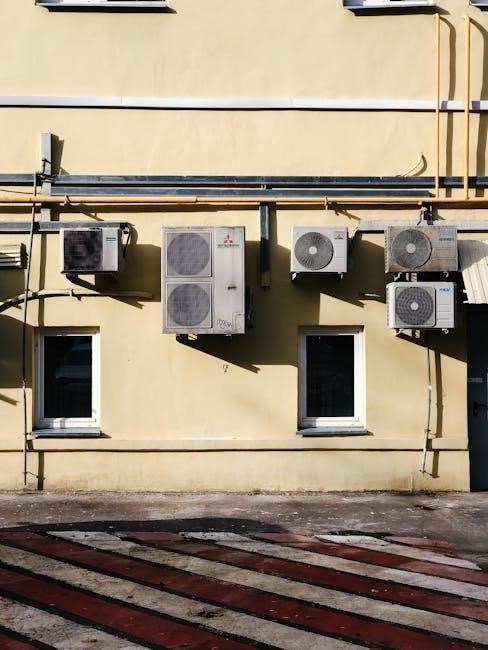
Legal Considerations in HVAC Contracts
Contractual Obligations and Responsibilities
Termination Clauses and Penalties
Compliance with Local and Federal Regulations

Sample HVAC Maintenance Contracts
Residential HVAC Maintenance Agreement Template
Commercial HVAC Service Contract Example
Preventive Maintenance Agreement Sample
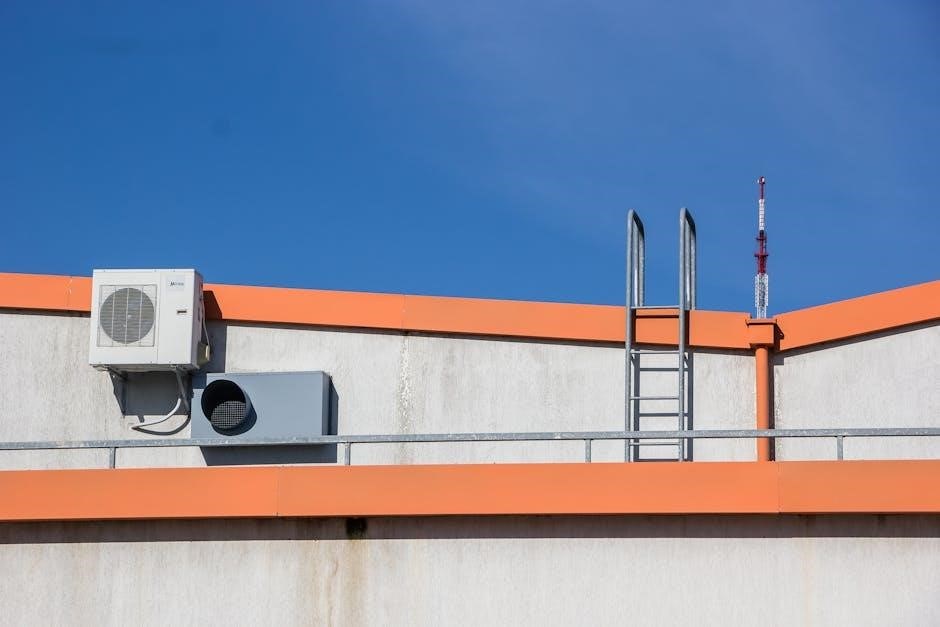
Customizing Your HVAC Maintenance Contract
Adding Specific Services or Equipment
Including Emergency and Priority Services
Modifying Payment Terms and Schedules
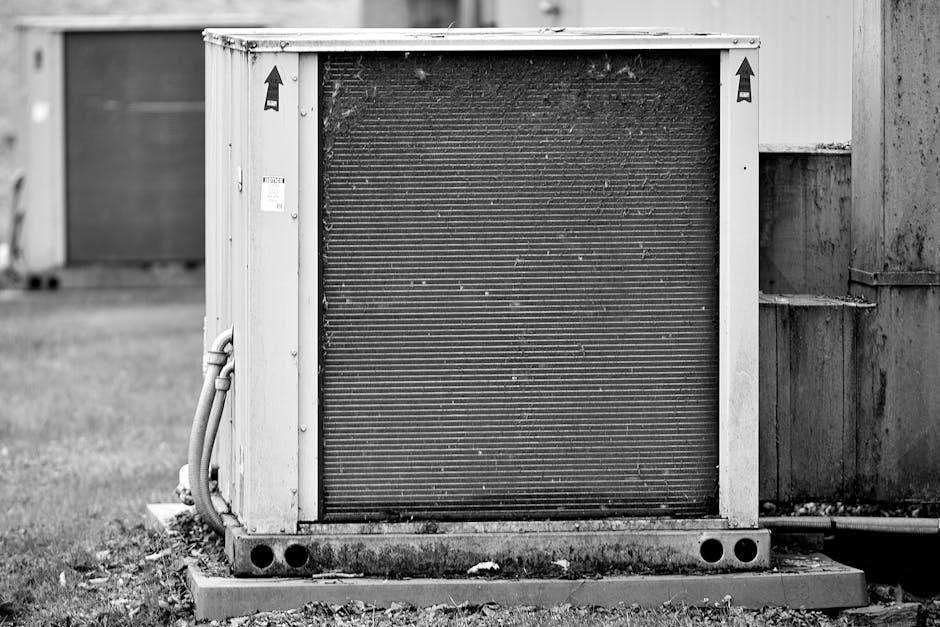
Best Practices for HVAC Service Providers
Clear Communication of Contract Terms
Providing Detailed Service Reports
Ensuring Customer Satisfaction

How to Create an HVAC Maintenance Agreement
Using Templates and Software Tools
Including Essential Clauses and Provisions
Finalizing and Signing the Agreement
Final Thoughts on HVAC Maintenance Contracts
Encouraging Property Owners to Invest in Contracts
Future of HVAC Maintenance Agreements
